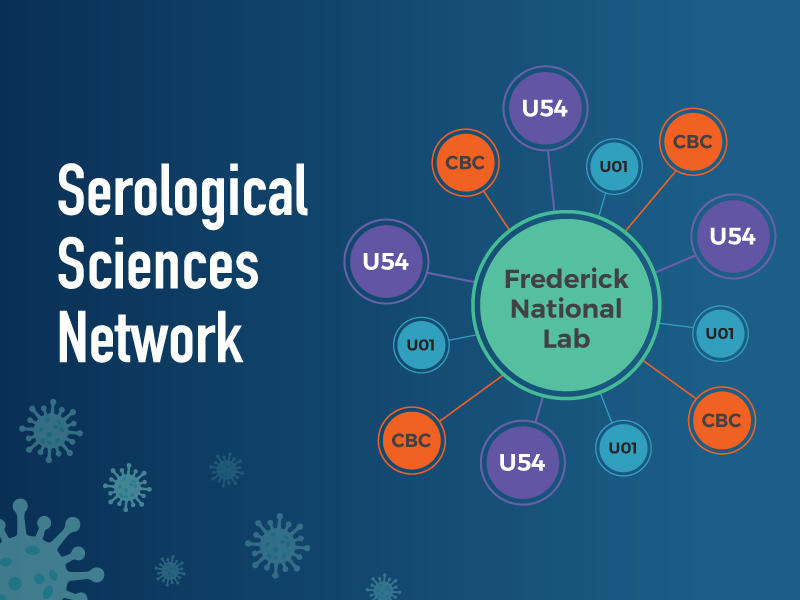NCI Seeks Applications for SeroNet COVID-19 Research
, by Dr. Dinah S. Singer
In follow-up to her recent NCI Bottom Line blog post on Cancer Research in the Era of COVID-19, NCI’s Deputy Director for Scientific Strategy and Development, Dr. Dinah S. Singer, expands on how NCI is supporting and funding COVID-19 research. In particular, Dr. Singer discusses NCI’s recently launched Serological Sciences Network (SeroNet), which aims to understand all aspects of the immune response associated with the SARS-CoV-2 viral infection.
We are at a defining moment for public health. The science community, health agencies, and those serving on the front lines of health care are working tirelessly to understand SARS-CoV-2 and combat the COVID-19 threat. Collectively, we face one of the greatest public health challenges of our careers.
At NCI, we are confronting the COVID-19 challenge in many ways. Most recently, NCI launched the Serological Sciences Network, or SeroNet, to rapidly expand understanding of all aspects of the immune response associated with SARS-CoV-2 viral infection. Extramural researchers have an exciting opportunity to contribute to serology science of this disease through two research opportunities that I describe below. As with so many other elements of our COVID-19 research and response, NCI is coordinating SeroNet with the National Institute of Allergy and Infectious Diseases (NIAID) and other public health agencies across government.
NCI is supporting SeroNet with a portion of the $306 million emergency funding that Congress appropriated in late April for NCI to develop, validate, improve, and implement serological testing and associated technologies. NCI recognizes the urgent need to establish SeroNet to help respond to the pandemic. However, cancer research and cancer patients remain NCI’s top priority.
SeroNet has five components, and on June 5 NCI published funding opportunity announcements for extramural awards to support two of those components: Serological Sciences Centers of Excellence and Serological Sciences Research Projects.
I strongly encourage extramural researchers to consider submitting proposals for these two announcements.
SeroNet Strategy
The five SeroNet components include:
- Serological Sciences Centers of Excellence based on the announcement NCI and NIAID posted on June 5 for Emergency Awards for SARS-CoV-2 Serological Sciences Centers of Excellence to conduct two or three serological research projects per center.
- Serological Sciences Research Projects based on the announcement NCI and NIAID posted on June 5 for Emergency Awards for Research Projects in SARS-CoV-2 Serological Sciences.
- Serological Sciences Capacity Building Centers designed to develop and expand the national serological testing capacity, with the goal of scaling up to a screening capacity of 10,000 patients per week, per center.
- a SeroNet Serology Laboratory that draws on the expertise of the Human Papillomavirus (HPV) Serology Lab at NCI’s Frederick National Laboratory for Cancer Research and is already engaged in evaluating the sensitivity and specificity of SARS-CoV-2 test kits.
- a Serological Sciences Network Coordinating Center to foster coordination and collaboration across all SeroNet components.
In advance of issuing the two funding opportunities for Centers of Excellence and research projects, on May 14, NCI solicited input from the biomedical research community through a Request for Information designed to help NCI define priorities for serology research related to COVID-19. We received 48 responses to our request, and the information guided our thinking as we moved forward with the June 5 announcements on funding opportunities. Thanks to all who responded. We received many constructive recommendations.
Priorities for Centers of Excellence and Research Projects
NCI is inviting applications that address a broad range of SARS-CoV-2 serological priorities. Examples include research to:
- characterize the immune responses from SARS-CoV-2 viral infection
- understand mechanisms driving serological, humoral, and cellular immune responses
- determine the host, genetic, and environmental modifiers of immune response
- determine the serological correlates of disease pathogenesis, including whether, and to what extent, there is protection against future infection
- define barriers to access, communication, and implementation related to SARS-CoV-2 serological testing
These are only examples of the types of research applications NCI and NIAID are seeking. I encourage you to read the two announcements to find additional details, including research areas NCI and NIAID consider out of scope.
Funding Available
NCI plans to award $8 million–$16 million for Centers of Excellence, funding four to eight U54 center awards, with per-award direct costs capped at $1.5 million. In addition, NCI plans to award $6 million–$8 million for U01 research projects, funding five to ten awards, with per-award direct costs capped at $500,000.
The deadline for these U01 and U54 applications is July 22, 2020. NCI expects to issue awards in late September 2020, funding the cooperative agreements for 5 years. For both the Centers of Excellence and research projects, NCI is encouraging applicants to submit proposals that are relevant to cancer.
Organization and Structure of the Centers of Excellence
In the funding opportunity for the SeroNet Centers of Excellence, NCI identified three further application elements. First, applicants must propose an administrative core to manage and coordinate research activities of their center. The administrative core must also serve as the liaison between their center and other components of SeroNet, while also performing data sharing and related responsibilities. Furthermore, NCI expects all centers to collaborate across SeroNet, sharing data, results, and reagents.
Second, applicants can propose shared research cores for their center, to provide technical, experimental, or computational expertise across two or more of the center’s research projects.
Third, the two or three research projects each center details in its application should collectively constitute a multifaceted approach to understanding serological response to SARS-CoV-2.
NCI also expects the leaders and senior investigators of each center to participate in trans-SeroNet initiatives, such as collecting and preserving samples and collecting clinical or epidemiological data related to COVID-19. Again, interested applicants can find full details on these matters in the funding announcements.
In a future NCI Bottom Line blog post, I will describe the other components of SeroNet in greater detail, as well as other NCI research related to SARS-CoV-2. In this post, however, I wanted to share these details and encourage responses to the two June 5 funding opportunities NCI and NIAID announced, which are cornerstones of SeroNet and fundamental research priorities for addressing the current pandemic.
Once again, many thanks for your enduring commitment to cancer patients and cancer science, especially during this public health crisis.

